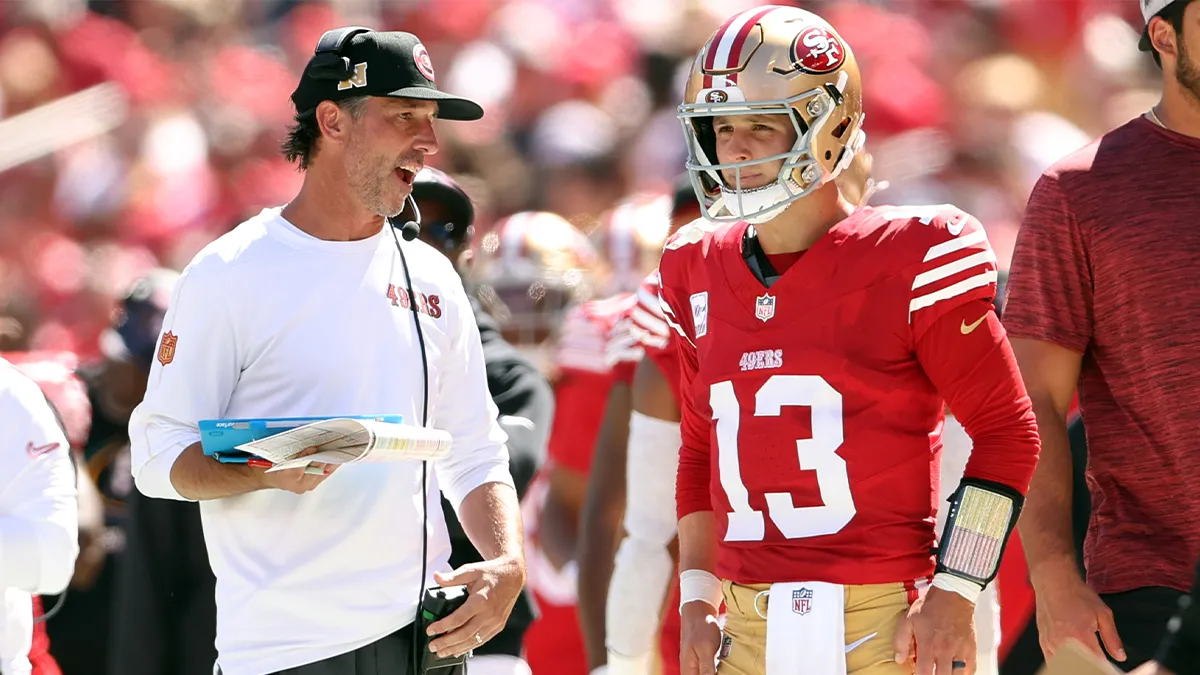NFL commissioner Roger Goodell admitted Friday that the league was wrong for "not listening to NFL players earlier" and that they "encourage all to speak out and peacefully protest," but his 81-second video didn't mention former 49ers quarterback Colin Kaepernick.
Kaepernick first sat, then kneeled during the playing of the national anthem before games in the 2016 season to protest police brutality and institutional racism. The QB's protest recently has received renewed attention, as demonstrations against the same issues spring up around the globe following the death of George Floyd, a 46-year-old African American man, in Minneapolis police custody last Monday.
"We, the [NFL], believe black lives matter," Goodell said Friday. "I personally protest with you and want to be part of the much-needed change in this country. Without black players, there would be no [NFL] and the protests around the country are emblematic of the centuries of silence, inequality and oppression of black players, coaches, fans and staff.
Stay in the game with the latest updates on your beloved Bay Area and California sports teams! Sign up here for our All Access Daily newsletter.
"We are listening. I am listening. And I will be reaching out to players who have raised their voices and others on how we can improve and move forward for a better, more united NFL family."
The commissioner's comments came shortly after the league shared a video of players asking for the NFL to "listen" and admit they were "wrong in silencing our players from peacefully protesting." Multiple players, including star New York Giants running back Saquon Barkley, first shared the video Thursday.
"We will not be silenced," the players said. "We assert our right to peacefully protest."
Protests have taken place nationwide in each of the 10 nights following Floyd's death prior to this story's publication. Floyd pleaded that he couldn't breathe as Derek Chauvin, a since-fired officer who is white, pressed his knee into Floyd's neck for nearly nine minutes. The 46-year-old's death occurred within months of Breonna Taylor, 26, and Ahmaud Arbery, 25, dying, all as the coronavirus pandemic continues to disproportionately affect African Americans. Louisville police fatally shot Taylor in her home while reportedly performing a "no-knock" warrant, and two white men allegedly shot and murdered Arbery as he jogged around his Georgia neighborhood.
San Francisco 49ers
Find the latest San Francisco 49ers news, highlights, analysis and more with NBC Sports Bay Area and California.
Demonstrators have taken to the streets to protest the same issues Kaepernick highlighted, nearly four years after he first began protesting. Kaepernick, who agreed to kneel during "The Star-Spangled Banner" after consulting with former Seattle Seahawks long-snapper and Green Beret Nate Boyer, faced criticism for disrespecting the American flag and the country's veterans. Goodell said he didn't "necessarily agree with what [Kaepernick was] doing" in his first public comments after Kaepernick's protest.
“We have to choose respectful ways of doing that so that we can achieve the outcomes we ultimately want and do it with the values and ideals that make our country great,” Goodell told The Associated Press on Sept. 7, 2016. “I think it’s important to have respect for our country, for our flag, for the people who make our country better; for law enforcement; and for our military who are out fighting for our freedoms and our ideals.”
Goodell said in 2017 players had a "responsibility" of demonstrating "at the right time and in the right way." The NFL owners approved a national-anthem policy in May 2018 that would've required players to stand on the sideline as "The Star-Spangled Banner" played, but the league and the NFL Players Association announced in July there would be no new policy.
[RELATED: 49ers' Shanahan wants NFL to fix coaching diversity issue]
Kaepernick argued his protest cost him his career in a collusion lawsuit he settled with the league last February. The quarterback opted out of his contract ahead of the 2017 season, when the 49ers told him he'd otherwise be released, and has not been signed since. The NFL organized a workout for Kaepernick at the Atlanta Falcons' facility last November, but Kaepernick pulled out of the workout after the league barred media access and his lawyers deemed a liability waiver "unusual."
"I've been ready for three years, and I've been denied for three years," Kaepernick told reporters after moving the workout to a high school outside of Atlanta. "We all know why I came out here and showed it today in front of everybody -- we have nothing to hide. So we're waiting for the 32 owners, the 32 teams, Roger Goodell, all of them to stop running. Stop running from the truth, stop running from the people."
Goodell said in December that the NFL had "moved on" from Kaepernick after he "chose not to take" the opportunity the NFL gave him by moving the workout.
[49ERS INSIDER PODCAST: Listen to the latest episode]


